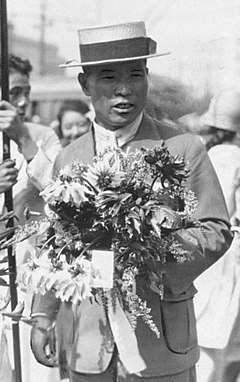Shizo Kanakuri
Shizo Kanakuri (金栗 四三, Kanaguri Shisō or Kanakuri Shizō, 20 August 1891 – 13 November 1983) was a Japanese marathon runner and one of the early leaders of track and field athletics in Japan. He has been celebrated as the "father of marathon" in Japan.
 Shizō Kanakuri returning from the 1924 Olympics | |
| Personal information | |
|---|---|
| Native name | 金栗 四三 |
| Nationality | Japan |
| Born | 20 August 1891 Nagomi, Kumamoto, Japan[1] |
| Died | 13 November 1983 (aged 92) Tamana, Kumamoto, Japan |
| Height | 1.70 m (5 ft 7 in) |
| Weight | 64 kg (141 lb) |
| Sport | |
| Sport | Marathon |
| Retired | 1924 |
Biography
Kanakuri was a native of Tamana, Kumamoto, Japan and attended the Tokyo Higher Normal School. During the November 1911 domestic qualifying trials for the 1912 Stockholm Olympics, although the length of the course was probably only 40 km (25 mi), Kanakuri was reported to have set a marathon world record at 2 hours, 32 minutes and 45 seconds.[2][nb 1] He was thus selected as one of the only two athletes that Japan could afford to send to the event.
However, Kanakuri is best known for disappearing during the marathon race in the 1912 Stockholm Olympics. Kanakuri had a rough 18-day-long trip to Stockholm, first by ship and then by train all through the Trans-Siberian Railway, and needed five days to recover for the race.[4] The race was held in Sollentuna Municipality, in Sweden, in – for this time – unexpected 25 °C (77 °F) heat,[5] and over half of the runners in the event had hyperthermia. Kanakuri, weakened by the long journey from Japan, and having problems with the local food, lost consciousness midway through the race, and was cared for by a farming family. Being embarrassed from his "failure" he silently returned to Japan without notifying race officials. Swedish authorities considered him missing for 50 years before discovering that he was living in Japan and had competed in subsequent Olympic marathons. In 1967, he was contacted by Swedish Television and offered the opportunity to complete his run. He accepted and completed the marathon in 54 years, 8 months, 6 days, 5 hours, 32 minutes and 20.3 seconds, remarking, "It was a long trip. Along the way, I got married, had six children and 10 grandchildren."[6]
Despite this setback, Kanakuri was selected to participate in the 1916 Summer Olympics, which were subsequently cancelled due to World War I. However, Kanakuri did compete in the 1920 Summer Olympics held in Antwerp, Belgium, where he finished the marathon race in 2 hours, 48 minutes and 45.4 seconds and placed 16th. Kanakuri subsequently participated in the 1924 Summer Olympics, where he failed to finish the race. Kanakuri is also known for his role in establishing the Hakone Ekiden relay marathon in 1920.[6] From 2004, the top prize in this race was named in his honor.
He died at the age of 92 on November 13, 1983 at his hometown of Tamana in Kumamoto Prefecture, Japan.[7]
See also
- Japan at the 1912 Summer Olympics
- Idaten, a 2019 taiga drama where Kanakuri is played by Nakamura Kankurō VI
Notes
- Road running historian Andy Milroy, writing for the Association of Road Racing Statisticians, has indicated that "25 miles was the distance of the first Japanese marathon held in 1911". Predating Kanakuri's performance, Milroy also indicated that a "professional world record" at the 25 mile distance of 2 hours, 33 minutes and 42 seconds was set by British runner Len Hurst on August 27, 1903.[3]
References
- The Asahi Shimbun (6 January 2019). "VOX POPULI: Town braces for tourist boom from TV drama about runner". The Asahi Shimbun. The Asahi Shimbun Company. Retrieved 19 August 2019.
- Ekiden...who? Lydiard Foundation Blog
- World Record Progressions – Track. arrs.run
- Shizo Kanakuri. sports-reference.com
- The big day during the 1912 Olympic Games. Jubileemarathon.se. Retrieved on 7 June 2015.
- Corkill, Edan (15 July 2012). "Better late than never for Japan's first, "slowest" Olympian". The Japan Times. Retrieved 4 October 2019.
- マラソンの父 金栗四三 Archived 8 April 2009 at the Wayback Machine